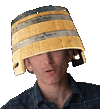DraQ
Well,
one of the things that keep Skyrim from forcing players into concepts is that the game's plot doesn't recognize archetypes. Another is that a fighter/mage/thief with perks all over the place can still be effective in combat. I don't think Skyrim even does any job at forcing character archetypes, its out of the game's scope (RPG label not withstanding.
Yes, a pure RPG is likely a silly concept under that definition.
So... players cannot learn about the strenghts and weaknesses of their characters, as well as become more adept at controlling their parties because they aren't actually Larping? Wtf?
Reductio ad absurdum. Can you respond to this?
When you load up a saved game in the middle of an RPG, play for an hour without leveling up during that gameplay session, and then quit, were you not playing an RPG?
Character development is one feature, one aspect of an RPG's system. An important one, pretty much an essential one, but it's not the core of the system. The core of the system is the stats and skills that the player actually uses on a minute-to-minute basis.
At which point every game ever effectively becomes an RPG because stats and 'skills' are what describes 'characters' in so many games, from Street Fighter to CoD.
My definition of a RPG is close to hiver's, but the wording is different and there's something else I'd like to add (bolded):
<A RPG is a game that focuses on character development and roleplaying. Given that a certain amount of freedom is required for all forms of interpretation, this focus favours minimal (on part of the developers) and
player-driven storytelling, as the player is conditioned to either follow or create a character concept of his own. This character concept is popularly defined and its progression is popularly conveyed through so called 'RPG Elements', from the statistical description of a character to experience points. But more importantly, the game must also define who the character
isn't, by supporting a large number of character concepts but not all or too many at the same time: creating a context that is larger than the player itself and, thus, differing player's experiences through the character concepts themselves, as opposed to the manipulation of a common avatar or a common universe.
A better RPG can be achieved by adding and further elaborating mechanics (such as character creation and progression system, ie chargen and level ups/point allocation) and game content (such as optional quests) that conditions character development. By removing any of these features without return, a RPG franchise begins its trek toward other foci (Exploration, Action, Strategy), likely on purpose.>
Keep in mind that character development, as with character arcs, aren't immediate. And there's the answer to your question. If you play a RPG before any character-defining mechanics kick in, then you didn't really roleplay at all. The game becomes more and more of a RPG as more and more choices are made as to who your character are within the game's story. If you make no relevant choice, either the game isn't a RPG or you never got to the interesting parts. If the RPG is any good, you probably started a new game, did nothing at all, and then quit.
Which is why I like Toxic's term. 'Character Development' means that the game
begins at Chargen (Character Creation) and filters through the 'Clay' (pre-game/choices state where all supported character concepts are possible) as per certain mechanics, level ups, stat allocation, plot choices (Character Progression/Arcs).


























